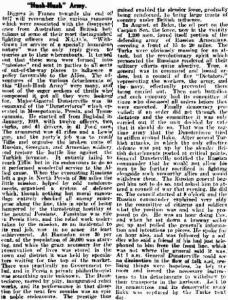Western Mail, Thursday, 2 January 1930, p. 2
"Hush-Hush" Army.
Diggers in France towards the end of 1917 will remember the various rumours which were associated with the disappearance from Australian and British, battalions of some of their most distinguished fighting officers and N.C.O.'s "Withdrawn for service of a specially hazardous nature" was the only reply given to queries as to their whereabouts. It turned out itihat these men were formed into "missions" and sent in parties to all sorts of out of the way places to influence policy favourable to the Allies. The adventures of the various detachments of this "Hush-Hush Army" were many and most of the eager seekers of thrills who composesd it got all they were looking for. Major General Dunsterville was in command of the "Dunsterforce" which operated in Mesopotamia, Persia, and Transcaucasia. He started off from Baghdad in January 1918 with twelve officers, two clerks and 41 drivers, in 41 Ford cars. The armament was 41 rifles and a Lewis gun, and the party's job was to reach Tiflis and organise the broken units of Russian, Georgian, and Armenian soldiery and restore the battle line against the Turkish invasion. It entirely failed to reach Tiflis, but in its endeavours to do so it performed wonderful service to the Allied cause. When the evacuating Russians left a gap in North Persia of 300 miles the little mission, helped by odd reinforcements, organised a system of defence which, though nothing but moral camoflage entirely checked all enemy enterprise along the line, this in spite of being hampered by the threatening hostility of the neutral Persians. Faminíne was rife in Persia then, and the relief work undertaken by the mission, as an incidental to its real job, was in no sense its least achievement. At Hamadan ever 30 per cent, of the population of 50;000 was starving, and while the grain neccessary for the preservation of lives was stored in the town and district it was held by speculators waiting for the top of the market. There was practically no Government relief, and in Persia a private philanthropist was something quite unknown. The Dunsterforce, moved by pity, inaugurated relief works, and its performance in that direction for the next few montibs was an epic in noble endeavours. The prestige thus gained enabled the slender force gradually being reinforced, to bring large tracts of country under British influence.
In August, at Baku, the oil port on the Caspian Sea, the force, now in the vicinity of 1,200 men, found itself portion of the defending army of Russian Armenians, covering a front of 15 to 20 smiles. The Turks were obviously massing for an attack, but the revolutionary spirit which permeated the Russians rendered all their military efforts quite abortive. True, a general was in command and issued orders, but a council of five "Dictators," representing the workers, the army, and the navy, effectually prevented them being carried out. Then each battalion and each company had its committee of three who discussed all orders before they were executed. Finally democracy prevailed: if an order did get through the dictators and the committee it was only carried out if the unit decided by vote that it should do so. That was the ragtime army that the Dunsterforee tried to stiffen around Baku. After several Turkish attacks, in which the only effective defence was put up by the slender British detachments posted at critical points, General Dunsterville notified the Russian commander tliat he would not allow his men to be further sacrificed in fighting alongside such unworthy allies and would withdraw them. The Russian general begged him not to do so; and asked him to attend a council of war that evening. He did so. The council started at 8 o'clock and the Russian commander explained very ably to the committee of citizens and soldiers what the position was and what he proposed to do. He was an hour doing this, and when he sat down a brawny sailor got up and pulled tho general's information and intentions to pieces. He spoke for an hour also, and was followed by a soldier who said a friend of his had just telephoned to him from the front line which was not where the general said it was. At 1 a.m. General Dunsterville could see no dimunition in the flow of talk and realising things were hopeless, he left the room and issued the necessary instructions to his detachments to withdraw to their transports in the harbour. Left to its committees and its democratic army Baku was captured by the Turks next day.









